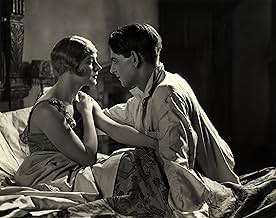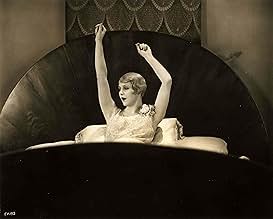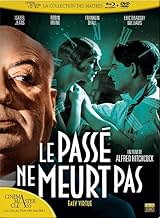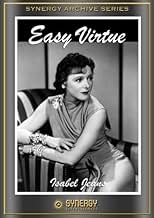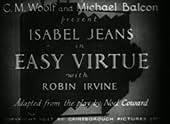IMDb RATING
5.4/10
3.3K
YOUR RATING
A recently divorced woman hides her scandalous past from her new husband and his family.A recently divorced woman hides her scandalous past from her new husband and his family.A recently divorced woman hides her scandalous past from her new husband and his family.
- Director
- Writers
- Stars
Enid Stamp-Taylor
- Sarah
- (as Enid Stamp Taylor)
Alfred Hitchcock
- Man with Stick Near Tennis Court
- (uncredited)
Benita Hume
- Telephone Receptionist
- (uncredited)
Ben Webster
- Justice Halstead
- (uncredited)
- Director
- Writers
- All cast & crew
- Production, box office & more at IMDbPro
5.43.3K
1
2
3
4
5
6
7
8
9
10
Featured reviews
Sowing the seeds of later Hitchcock masterpieces
While many have dismissed this silent film of Hitchcock as an insignificant work, I found this film anticipates the virtues of the later works of the director. Hitchcock often relied on strong stories/scripts/plays whether it was du Maurier or Ernest Lehman or Ben Hecht or Anthony Shaffer to make his cinema tick. In this film it was the brilliant playwright Noel Coward. Just as "Frenzy" (script of Shaffer) ends with the words "
you are missing your tie," the final words of "Easy Virtue" are the explosive "Shoot! There is nothing left to kill." The word "shoot" refers to the cameras of the paparazzi not guns.
Visually, Hitchcock would revert to the same scene in "Notorious", in "Torn Curtain" and even as a weapon of defense in "Rear Window." The underscoring of the irony of final scenes of Hitchcock films are interesting to note. Coward and Hitchcock were really sensitizing the viewer on the social perceptions of marriage and divorce. Coward and Hitchcock seem to ask us the connection between slandered reputation and "easy virtue." In "Blackmail" the jester (the painting) seemed to scoff at the so-called justice meted out by the law keepers in final sequence.
Visually the most poignant shot (repeated twice) in the film is the shot of the judge's wig from above his head as he looks up. The interiors of the sets seem remarkably similar to scenes from Russian (Eisenstein's "Ivan the Terrible") and German expressionist cinema. Who should be credited more for what the film offersCoward or Hitchcock. Probably both, in equal measure.
Visually, Hitchcock would revert to the same scene in "Notorious", in "Torn Curtain" and even as a weapon of defense in "Rear Window." The underscoring of the irony of final scenes of Hitchcock films are interesting to note. Coward and Hitchcock were really sensitizing the viewer on the social perceptions of marriage and divorce. Coward and Hitchcock seem to ask us the connection between slandered reputation and "easy virtue." In "Blackmail" the jester (the painting) seemed to scoff at the so-called justice meted out by the law keepers in final sequence.
Visually the most poignant shot (repeated twice) in the film is the shot of the judge's wig from above his head as he looks up. The interiors of the sets seem remarkably similar to scenes from Russian (Eisenstein's "Ivan the Terrible") and German expressionist cinema. Who should be credited more for what the film offersCoward or Hitchcock. Probably both, in equal measure.
"Virtue is its own reward they say - but 'easy virtue' is society's reward for a slandered reputation"
Easy Virtue is one of Hitchcock's interesting but not great films, that is neither among his best or worst. Not a terrible one but this is really not the master of suspense at his best. When it comes to his silent films, Easy Virtue is perhaps one of his weaker ones, with his best being The Lodger and his weakest being Champagne. It has a lot of good things. There are some very clever shots and Hitchcockian touches like in the opening courtroom scene with everything being shot like from the perspective of the judge through his monocle and the proposal over the phone showing only the reactions of the telephone operator. Hitchcock directs very well, though there is understandably the sense that he was still finding and developing his own style. The sets and costumes are lovely to watch, while Violet Farebrother plays her role with tremendous gusto and Isabel Jeans brings a lot of charm to hers. Robin Irvine is very bland though and the rest of the acting can feel rather overheated and exaggerated even with a silent melodrama. The characters do come across as stock and somewhat cardboard, there's little dimension to them and you don't really care for them either. The story is a let down, it begins brilliant and ends just as satisfyingly but there's half-an-hour at least of tedious melodrama and staid storytelling, the romance also lacks passion and you don't ever really feel the love between them. And some have made a good point about the benefits of having dialogue instead here, I have great appreciation for silent films but Easy Virtue was the sort of film being a comedy-social drama where dialogue would have helped it come alive. Overall, not terrible, not great, mixed view here if anything. 5/10 Bethany Cox
Rather dull
I occasionally watch a silent film.I do find it very frustrating when actors are mouthing words and we are expected to know what they are saying without benefit of intertwines. Byou far the best part of the film is the opening trial scene.After that it is all downhill and rather silly at that.Hitchin was capable of making stinkers egg Under Capricorn,and this was clearly one of them
Not much suspense
I think Easy Virtue would have worked better if we wouldn't have known Larita's background until John's family discovered it. Seeing it all laid out at the beginning of the movie removes much of the suspense. And even at only 80 minutes, the simple story feels too drawn-out.
A little dry and dull
In Alfred Hitchcock's Easy Virtue, a woman has some explaining to do when the family of her second husband finds out there was a first husband. That's because back in the day, divorced women were considered damaged goods, and upstanding families would steer well clear of such flighty harlots. Easy Virtue's tagline asks "Can she be blamed for a past she didn't create?" And the answer is yes, because she did create her past when she started making eyes at the man painting her portrait. But perhaps I am getting a little ahead of myself.
Larita Filton (Isabel Jeans) is married to an unnamed guy. Well, he probably has a name, but the movie doesn't tell us. Anyway, they're rich, and she's having her portrait done by a professional artist. One day the artist notices marks on Larita's wrist, and she mentions that her husband sometimes drinks too much. Thus a relationship is born, at least as far as they went in the 1920s, which meant it's possible Larita and the artist smooched once. Anyway, one fine day the husband comes home to find the two of them in an embrace. A gun is presented, and a shot is fired, and the artist dies. This is all told to us in flashback at the divorce trial, where the jury quite naturally finds in favor of the husband. Larita is shamed and shunned.
She finds herself chillaxing on the Mediterranean, and a chance encounter with a tennis ball leads Larita to meet John Whittaker (Robin Irvine), who's from a well-to-do family himself. They romance, yadda yadda, and soon they're wed. He brings her home to meet his parents and his two sisters for dinner. The stern matriarch is fairly sure she recognizes Larita, and eventually she pieces it together. Haughty hilarity ensues.
This is a silent film, obviously very early in The Master's career, and much more of a melodrama than a thriller with a twist. There's no twist, and because there are few sight gags one must rely on the intermittent title cards to follow the mouthed dialog. That's all well and good, but there was just too much predictability afoot, and the quality of the print did the movie no favors, either. That all makes Easy Virtue a curio in Hitch's long, long career, and little more.
Larita Filton (Isabel Jeans) is married to an unnamed guy. Well, he probably has a name, but the movie doesn't tell us. Anyway, they're rich, and she's having her portrait done by a professional artist. One day the artist notices marks on Larita's wrist, and she mentions that her husband sometimes drinks too much. Thus a relationship is born, at least as far as they went in the 1920s, which meant it's possible Larita and the artist smooched once. Anyway, one fine day the husband comes home to find the two of them in an embrace. A gun is presented, and a shot is fired, and the artist dies. This is all told to us in flashback at the divorce trial, where the jury quite naturally finds in favor of the husband. Larita is shamed and shunned.
She finds herself chillaxing on the Mediterranean, and a chance encounter with a tennis ball leads Larita to meet John Whittaker (Robin Irvine), who's from a well-to-do family himself. They romance, yadda yadda, and soon they're wed. He brings her home to meet his parents and his two sisters for dinner. The stern matriarch is fairly sure she recognizes Larita, and eventually she pieces it together. Haughty hilarity ensues.
This is a silent film, obviously very early in The Master's career, and much more of a melodrama than a thriller with a twist. There's no twist, and because there are few sight gags one must rely on the intermittent title cards to follow the mouthed dialog. That's all well and good, but there was just too much predictability afoot, and the quality of the print did the movie no favors, either. That all makes Easy Virtue a curio in Hitch's long, long career, and little more.
Did you know
- TriviaAlfred Hitchcock: Walking past a tennis court carrying a walking stick.
- GoofsWhile sitting with Larita after she is hit with the tennis ball, John's sitting position changes between shots.
- Quotes
[last lines]
Larita Filton: [to news photographers] Shoot! There's nothing left to kill.
- Alternate versionsThere is an Italian edition of this film on DVD, distributed by DNA Srl: "SOTTO IL CAPRICORNO (Il peccato di Lady Considine, 1949) New Widescreen Edition + FRAGILE VIRTÙ (1927)" (2 Films on a single DVD, with "Under Capricorn" in double version 1.33:1 and 1.78:1), re-edited with the contribution of film historian Riccardo Cusin. This version is also available for streaming on some platforms.
- ConnectionsFeatured in Hitchcock/Truffaut (2015)
Details
- Runtime
- 1h 20m(80 min)
- Sound mix
- Aspect ratio
- 1.33 : 1
Contribute to this page
Suggest an edit or add missing content

